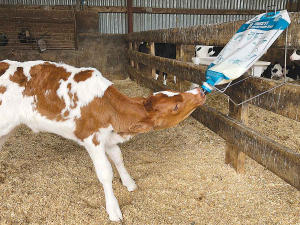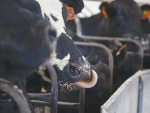Antahi Innovations Ltd, founded by veterinarian Ursula Haywood and husband Mark in 2016, has launched Trusti Colostrum bags and the Trusti Pasteur – a colostrum management system that helps maintain colostrum quality and also streamlines the process of feeding it.
Haywood says no other supplement has as much impact on a calf’s life as its first colostrum feed.
“Calves that receive high quality colostrum are healthier in general and have been shown to have a definite advantage in reproduction and milk production,” she says.
The company says in 2015 a New Zealand study found over 95% of farms were feeding substandard colostrum to their calves, with a low antibody concentration or a high contamination level.
Another key issue is feeding calves colostrum within the critical six-hour timeframe after birth.
“Spring is a really hectic period in our system, and the correct storage and feeding of colostrum can be pushed to the side,” Haywood says.
Read More:
- New-born need fresh colostrum
- Plan, prepare well for calving
- Follow the 3Q's for colostrum management
“It is worth getting it right, though, because the impact is huge. Calves that don’t receive high-quality colostrum quickly are 10 times more likely to become sick or die.”
Poor quality issues can be largely solved by a quick Brix test, clean harvesting equipment and appropriate refrigeration of colostrum to avoid deterioration.
Haywood says pasteurisation is less common in New Zealand than in non-seasonal farming systems overseas, where calves are fed from frozen colostrum banks – an effective way of ensuring calves receive maximum antibody absorption, and minimal disease.
Haywood says together the Trusti Colostrum bags and Trusti Pasteur make it easier for farmers to achieve that first critical feed and give calves the best chance at health.
Easy to use
Trusti colostrum bags are durable and reusable, with large spouts for easy filling and cleaning.
They attach to the award-winning Trusti Tuber drencher, or a high-quality teat, for easy feeding directly from the bag to reduce contamination between equipment. They allow for easy storage, and fast heating and cooling.
The Trusti Pasteur has an eight-litre capacity, able to pasteurise two, four-litre Trusti Colostrum bags at once, or thaw those bags from frozen in 20 minutes. You simply select 60 degrees for pasteurisation or 42 degrees for thawing.
“In New Zealand the main barrier to purchasing a pasteurising unit in the past has been the cost,” Ursula Haywood says.
“The Trusti Pasteur was designed with this issue in mind and is approximately one-fifth the price of the European units on the market.
“We hope the lower price point will remove the barrier to New Zealand farmers ensuring calves get high-quality first colostrum.”
Haywood recommends farmers buy an inexpensive secondhand fridge for the shed – a ‘colostrum’ fridge – and with the help of the Trusti Colostrum bags, they will find it easier to manage the storage and feeding of colostrum. If the colostrum is fed immediately after clean harvesting there is no need to refrigerate, but often the colostrum is left to sit for too long.
“Colostrum will be harvested and placed into Trusti Bags, and into the fridge. You can record the date, quality and other information on the outside of the bag.
“Colostrum can be maintained at high quality for three (unpasteurised) to seven (pasteurised) days in the fridge or can be frozen in the Trusti Bags for 12 months.”
When it comes time to feed calves, the Trusti Bag’s thin wall means the colostrum can be warmed quickly.













